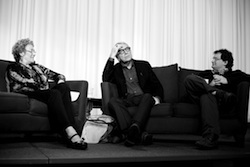By Janis Siegel , JTNews Correspondent
Traveling to the community meeting at a downtown Westlake Ave. venue on the subject of ending poverty in Seattle was a feat of strategic proportions — due to construction, closed streets, and congestion over massive Seattle Center renovations that signal the upcoming high-priced upgrades for tourists and locals to enjoy.
But while many in the city are prospering, University of Washington Prof. Marcia Meyers and Jewish Family Service CEO Ken Weinberg told an audience of nearly 60 at the event that since the onset of the economic recession in 2008, nearly one-quarter of a million households in Seattle — people just getting by — have now slipped below the poverty line.
“I think we had a problem before the recession, and then, of course, the recession made everything a lot worse,” said Meyers, director of the West Coast Poverty Center at the UW.
Meyers said that in Seattle today, a family of four living within the federal poverty guideline of $22,000 a year will spend 60 percent of that on yearly rent for the average one-bedroom apartment.
“By one estimate, there were about 250,000 families with kids that have slipped below what we call the threshold for economic security,” Meyer said. “That is twice the poverty line.”
The event was the last in a series of four public forums, “Judaism Confronts Human Injustice,” sponsored by the Sam and Althea Stroum Jewish Studies Program at the UW, the Association for Jewish Studies, the Legacy Heritage Fund, and the Henry M. Jackson School of International Studies at the UW.
Noam Pianko, an associate professor of Jewish Studies in the Jackson School and director of the Stroum Jewish Studies Program, moderated the evening’s conversation, which played like an informal living room-style discussion with feedback between audience members and panelists.
Meyers told the crowd that Seattle’s poverty rate is “strikingly average” compared to rates of poverty around the country, but she suggested that making changes in public policy could result in higher incomes for lower wage earners today, that, she said, haven’t seen increases since the 1970s.
Meyers also advocated for greater access to education and what she called a “tax-and-transfer system,” her substitute for the politically charged and highly decried term “income redistribution.” She quickly defended the concept that some call a form of socialism.
“We are very, very, very, very far from becoming a socialist country,” Meyers said.
Instead, Meyers said she sees her tax-and-transfer system as a “foundation of social protections,” in an effort to rebrand social safety net programs like Social Security as humane, effective, and poverty reducing.
“The problem in this country is that it doesn’t reach other populations,” she said. “We don’t have social insurance for working-age families.”
Meyers’ said she approves of tax breaks such as the mortgage deduction for homeowners and tax-free health insurance for those who have jobs with benefits, but again, believes that more people need to be economically able to take advantage of them.
Other programs that include welfare, food stamps, and housing assistance are good, too, added Meyers, but they don’t do anything to prevent poverty.
Reciting the lyrics to what has become a depression-era anthem, “Brother Can You Spare a Dime,” taught to him by his father as a child growing up in New York, Weinberg told the audience how crushing poverty caused his father to be “staggeringly damaged,” changing who he was for the rest of his life.
Today, he is hoping to dissolve some of the stereotypes about Jews that persist, particularly those that associate the Jewish community with wealth. His numbers reveal the real level of need in the Jewish community in Seattle.
“I asked the person in charge of our Emergency Services Department — that is, rent, utilities, and medications — and in 2007 we gave out, in just rent assistance, $43,000,” said Weinberg. “Last year we gave out $75,000, and if we had an additional $75,000, we could have distributed it all.”
Weinberg said he was proud of the work that JFS does but that as far as he’s concerned, it’s really only a “Band-Aid” over the problem of poverty that will never be eliminated in our society.
“Jewish Family Service has a food bank and we serve 4,000 families a month,” Weinberg said. “Of the 15,000 people we serve a year, about half of them fall below poverty level. In 2007, we saw 17,000 people and in this past year, 2011, we saw 22,000 people. Many of them are refugees from the former Soviet Union. What we did is we settled hundreds of thousands of Jews and then we dropped them.
“I think there’s a certain sense of noblesse oblige in members of my community,” he added. “I want to substitute the word charity with justice, so that when somebody contributes $10,000 to the food bank, it’s not charity, it’s justice.”
